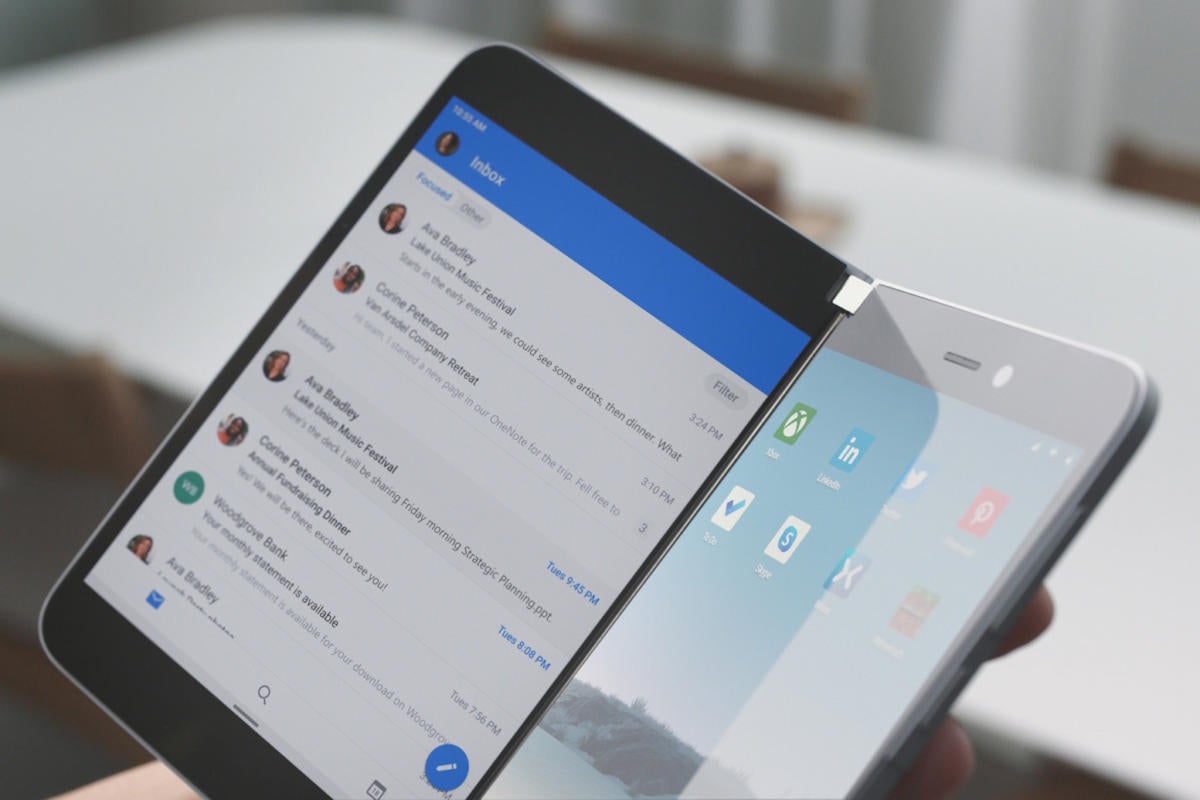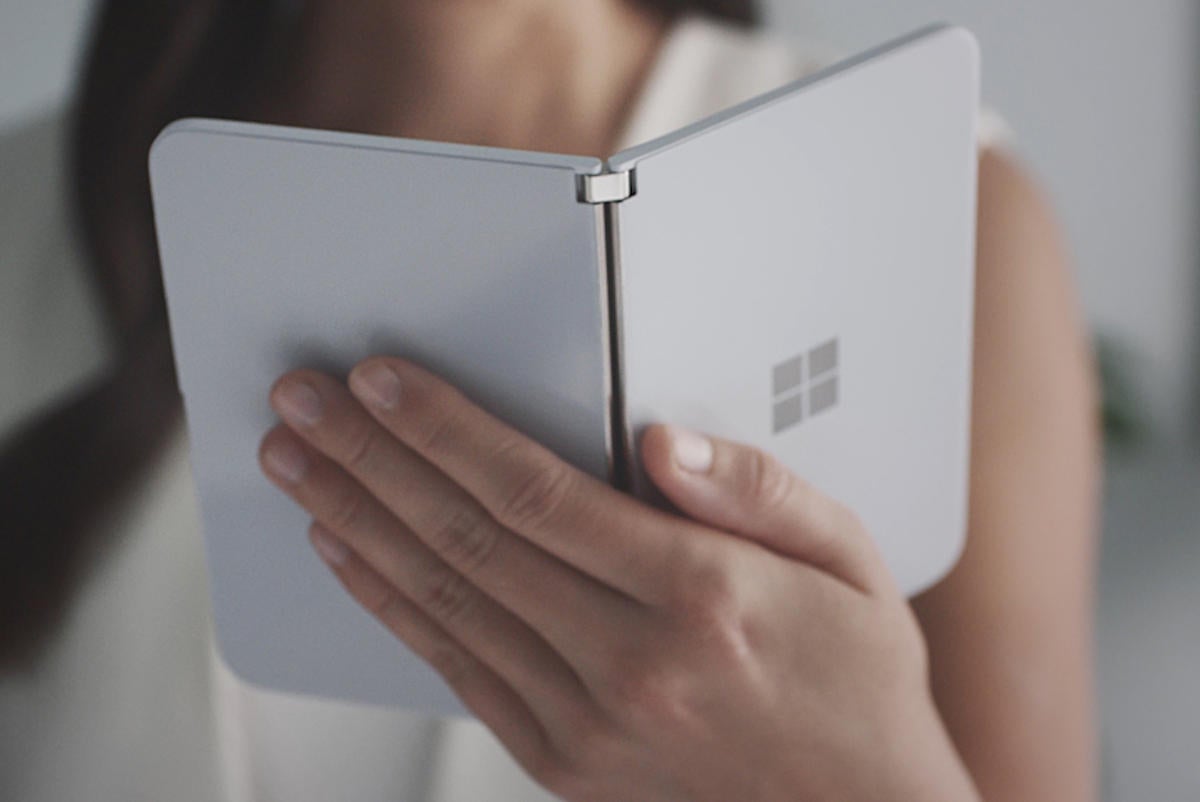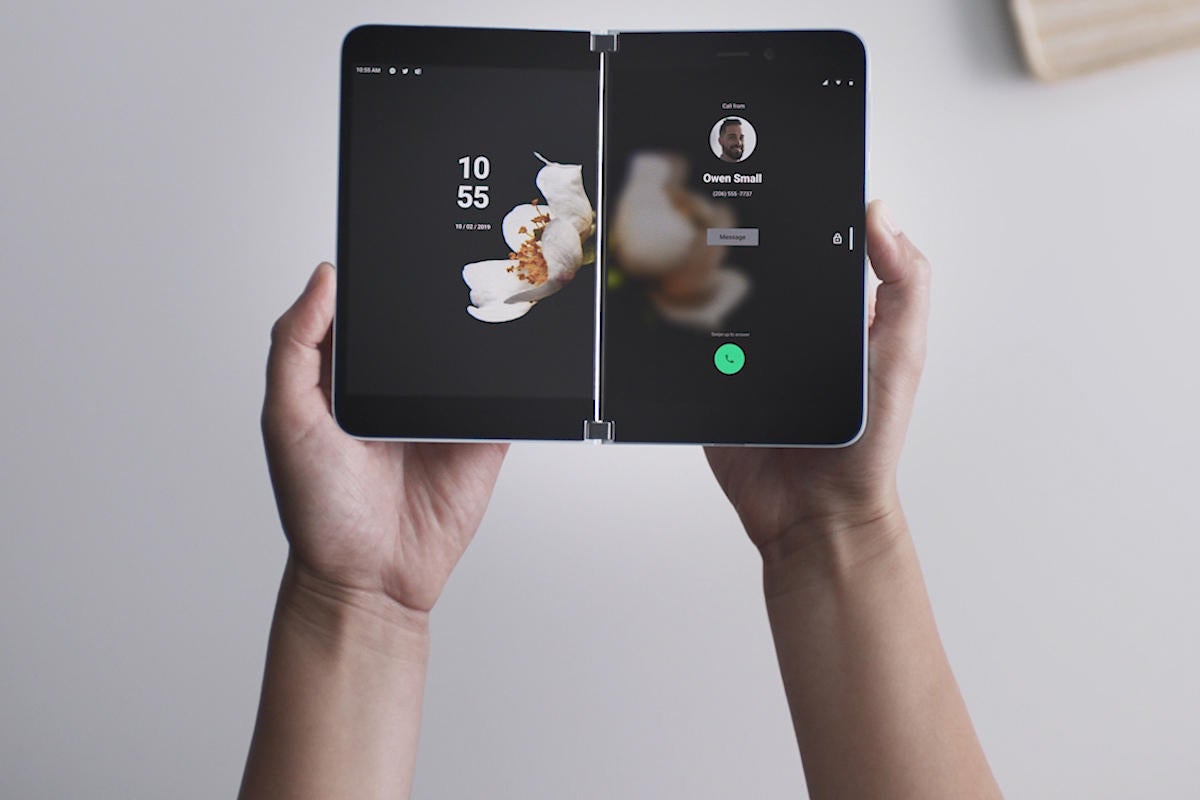Well, gang, it's finally happened: Hell has officially frozen over.
Didja hear about this? Microsoft is making its own Android phone. Let me rephrase that: Microsoft, the once-mortal-nemesis of Google, is building a phone running Google's operating system. Microsoft, the tech giant that tried and failed to claim its piece of the mobile ecosystem pie with Windows Mobile, is now staking its mobile future entirely on its competitor's platform.
Man. What a world we live in.
Now, to be fair, Microsoft's basically been building its own ecosystem within Android for a while already: After years of providing only sparse, subpar versions of its programs for Android, the MS crew started taking Android seriously a few years back. And boy howdy, was that one heck of a shift.
Nowadays, Microsoft maintains a sprawling suite of commendable Android apps — everything from its own custom-made home screen launcher to a popular third-party keyboard it snatched up and then slowly but surely started to, uh, Microsoft-ify. At this point, all it takes is a handful of downloads and a teensy bit of planning to create a complete Microsoft experience within any Android phone.
But that's the catch: The phone isn't Microsoft's — and that means the hardware and the core software experience remain outside of Microsoft's control. With last week's announcement of the Surface Duo, the company seems determined to take things up a notch and correct that small but significant limitation.
And the craziest part of all? The Surface Duo (which Microsoft insists shouldn't be categorized as a "phone," but, I mean, c'mon) isn't just your run-of-the-mill rectangular Android device. It sports two side-by-side screens that are connected by a thin hinge and able to fold 180 degrees in either direction. It's a pretty bold gamble for Microsoft to make — one that could either pay off enormously or cause the company to fall flat on its face once more.
Since the Duo isn't expected to ship until next year's holiday season, we're left with some pretty big questions about how exactly it'll work and what sort of value it will (or won't) provide. Specifically, as I've been chewing over the news and letting it marinate over these past several days, I've found myself coming back to the same set of burning questions — the answers to which could collectively determine the fate of both the phone itself and its greater impact on Android.
Think 'em through with me, won't ya?
1. How much will the Surface Duo cost?
Part of Microsoft's hesitance to frame the Surface Duo as a phone may come down to the fact that the company's hoping to avoid positioning the gadget as Just Another Android Smartphone™ and instead have it be seen as a brand new, one-of-a-kind mobile productivity system.
Why? It's simple: By downplaying the "Android phone" angle and focusing on the "Surface computer" notion, Microsoft can — in theory — set its device apart from the pack and allow it to exist in a category of its own. The company's explanation of the positioning pretty much spells it out:
"Surface has always been about creating and redefining categories; this is another example of that," a Microsoft spokesperson told me via email. "Sure, it makes phone calls, but it does much more than that. It’s a dual-screen Surface that fits in your pocket, bringing together the best of Microsoft productivity experiences, Android apps, and Surface hardware design into a single device you can take anywhere."
See what I mean? And this almost certainly isn't just about marketing, either; after all, if the Surface Duo isn't, in Microsoft's reckoning, a phone, it doesn't necessarily have to be priced like one.
So there's our first question: Just how high of a price of this thing gonna command? Microsoft's positioning of the product as an on-the-go productivity computer for business-minded individuals — not to mention its emphasis on the fact that the (ahem) phone has two 5.6-in. displays that fold out into what's effectively an 8.3-in. screen — makes me think the cost may be closer to the $2,000 tag of Samsung's silly Galaxy Fold than the $1,000-ish price of a typical high-end flagship phone.
Will people be willing to pay that much for a product like this? Should they be?
2. How many apps will fully support the Duo's dual-screen setup?
A key selling point of the Surface Duo's unusual form is the fact that you can — in theory — use apps across the device's two screens in some pretty interesting ways. The Duo will supposedly let you drag content from an app on one screen into an app on the other, stretch a single app across both of the screens, and move an app from one screen to the other in a way that feels seamless and natural.
And a key difference between the Surface Duo and earlier Android phones that have attempted this two-screen concept — aside from what appears to be just a better hardware implementation — is the fact that Android 10 actually lays the foundation for this sort of thing to happen on the operating system level. The feature was originally described as being about support for foldables, but its core concept is something Google calls "app continuity." That really just means it's a framework for developers to make their apps support a phone with multiple screen areas and be able to exist across those areas sensibly.
Still, it's up to app developers to implement support for that feature — and we all know how slow and unreliable Android app developers often are to come around to those sorts of standards. Especially given the fact that the number of devices taking advantage of foldable screens or multiple screens are presumably gonna be miniscule for the foreseeable future, will all the cool trickery Microsoft showed off in its Surface Duo demo actually work on any broad level?
If that sort of dual-screen harmony exists only for Microsoft's own apps and a small handful of others, the Surface Duo's appeal suddenly becomes significantly less strong.
And speaking of which....
3. What'll happen with apps that don't have proper dual-screen support?
No matter how good of a job Microsoft (or Google) does in convincing developers to get ahead of the game and invest resources in creating dual-screen-optimized app experiences, it's inevitable that a fair number of Android apps are not gonna support the setup by the time the Duo launches.
So what happens when you use what I guess we could call a "legacy app" — one whose developer hasn't updated its code in order to explicitly support the two-screen configuration? Will there be some sort of reasonably elegant fallback system in place for those instances, or will it be painfully clunky, confusing, and awkward when you try to drag a non-optimized app from one screen to another or try to drag content from a properly optimized app into a legacy holdout?
The answer to that question should tell us volumes about what the real-world Duo-using experience will be like.
4. How advantageous will the whole dual-screen thing really be, anyway?
The entire Surface Duo proposition hinges on the idea that having a dual-screen phone and being able to interact with apps across those two screens is going to be legitimately advantageous and something you'll actually work into your regular phone-using routine. But once you get past the initial novelty of carrying around a device like this, is that benefit even something you'd tap into and appreciate all that frequently?
I mean, think about it: As it stands now, most of us tend to do little odds and ends on our smartphones and then save the most intensive work for when we're back at our laptops or desktop computers — right? Will having the ability to stretch (some) apps out to a larger size and to more easily run multiple apps side by side, with dragging and dropping as an option, really be all that compelling in a handheld-device form? How often will you do anything with that setup that you couldn't accomplish just as easily with the already-pretty-big screen on your regular smartphone — or that you wouldn't still prefer to hang onto and handle once you're back at a full-sized computer?
 Microsoft
Microsoft
Are two screens really better than one?
Microsoft is clearly banking on the answer being "enough to make it seem worthwhile," but until we're able to spend time with this thing in the real world and get past that new-gadget-smell period, we won't truly know what type of genuine value the form will or won't offer in day-to-day life.
5. Will using the Duo feel more like a Microsoft experience? Or will it still be Google-centric?
In general, Google keeps a fairly tight grip on Android. Companies that develop devices with Google's Android software and its full suite of accompanying services have a laundry list of requirements to contend with, not least of which is the emphasis on a Google account for signing in and syncing and the placement of Google services all throughout the operating system.
More than any other Android-device-creating company, though, Microsoft has its own legitimately thriving ecosystem of competing services. Microsoft users are accustomed to signing in with their Microsoft accounts and accessing their Microsoft apps for things like email and office work.
So will the Surface Duo live within the standard Android parameters, where the Microsoft layer is forced to exist within the Google universe — meaning you'll have to first sign into the phone with Google and then sign in separately with Microsoft? (Awkward.) Will you end up with warring factions of productivity apps angling for your attention? (Unpleasant.) Or will Microsoft, given its clout and the number of business folk it could conceivably bring into the fold, strike some sort of deal for an unprecedented exception that'd let it claim some manner of autonomy over its environment?
The idea of that happening goes against everything Android represents to Google, on the surface, but this is also Microsoft we're talking about here — so who knows? If Google were ever to bend its rules in any way, this could be the time and place it happens.
The logical next question, then:
6. What will Microsoft's Android software experience be like?
We've seen Microsoft's take on the Android home screen, courtesy of the company's surprisingly decent Microsoft Launcher app — but when the company has complete control over the look and feel of the phone's software, how far will it go?
Will we see an LG-reminiscent take on Android, with ample change for the sake of change and a misguided emphasis on "differentiation" through arbitrary interface meddling? Will Microsoft try to give Android a Windows-like appearance in terms of its menus and other core elements, in order to create consistency across its own various products? Or will the company stick reasonably close to the Android standard and just add in some subtle visual touches to make the software feel less like Google's and more like its own?
Only time will tell the answer — along with the answer of what the ultimate result will be like to use and whether it ends up being an asset or a liability of the Duo device.
And on a not-entirely-unrelated note...
7. How will Microsoft do with software updates?
This one's incredibly important, especially for a company like Microsoft: Other than Google, as we've discussed approximately 7.4 gazillion times over the years, almost every Android manufacturer is embarrassingly bad about providing timely and ongoing operating system updates to its devices. It's a problem that never seems to get any better, despite Google's best attempts to make the upgrade delivery process easier and less resource-intensive.
If any other company were to have the drive and ability to match Google's software support standard, Microsoft sure seems like it'd be it. Microsoft is laser-focused on the enterprise market and on winning over the trust of serious business users, and no serious business user should be using a phone with software that's months out of date. Microsoft, of all entities, is keenly aware of this.
So will Microsoft manage to send out both security patches and OS updates as quickly as Google does? Will it do so for a full three years, like Google alone does right now with its Pixel devices? Could it exceed that and set a whole new standard for the platform? Or will it fall into the patterns of other Android device-makers who focus on short-term hardware sales over long-term satisfaction?
More than any other question on this list, this is one I'm eager to see answered.
8. Will the Duo's single-camera setup be a limitation?
Microsoft may be positioning the Surface Duo as a business-aimed productivity device, but let's not kid ourselves: Every mobile device nowadays does double-duty and also addresses our personal needs, at least to some degree. And there's nowhere that's more apparent than in the realm of mobile photography.
Whether a phone is primarily intended for personal use or for business, most of us expect to be able to whip the thing out at a moment's notice and snap a good-lookin' photo in just the right moment. And on the Surface Duo shown off at Microsoft's event, the phone sports only a single camera — one that resides inside the device, after you open it up.
 Microsoft
Microsoft
The Duo's exterior has no camera. Will that be a problem?
Questions about photo quality aside, how problematic will it be to have to pull your phone out of your pocket and then open it up and flip it over before being able to take a photo? Microsoft has said the device's hardware is essentially complete at this point and shouldn't change between now and the Duo's launch, so this is presumably the same camera arrangement we'll see when the thing actually goes on sale.
And finally...
9. Will the Surface Duo be an anomaly, or will other companies follow suit?
While Microsoft's been developing the Duo (a process the company says has been underway for three years, incidentally — and that some recently surfaced concepts indicate has been rolling around on a theoretical level for even longer), other Android device-makers have had their focus on vaguely similar devices with screens that actually fold instead of having a thin hinge between 'em.
Those devices, suffice it to say, have thus far been overridden with asterisks and hardly advisable for anyone to purchase. And based on everything we're seeing at this point, Microsoft's small-hinged dual-screen arrangement seems like it could (could) be a much more practical and sensible take on the same basic concept.
So will the Surface Duo kick off a whole new category of mobile devices? Will other companies eventually follow suit and try to create their own similar products? Or will the Duo remain a niche-appeal anomaly — another funky form experiment that ends up offering limited practical appeal?
The answer to this last question will ultimately depend upon the answers to the eight previous inquiries in this list. They're all answers we're unlikely to know for several more months yet — but the realities they represent are well worth contemplating as we think through Microsoft's Android gamble and work to wrap our heads around what's on the way.
For now, we can say one thing with near-100-percent certainty: Android hardware is about to get really interesting — and whether Microsoft's first self-made effort ends up being a breakthrough or a bust, the innovation and investment it represents within this platform can only benefit us all in the end.
Sign up for my weekly newsletter to get more practical tips, personal recommendations, and plain-English perspective on the news that matters.

[Android Intelligence videos at Computerworld]






